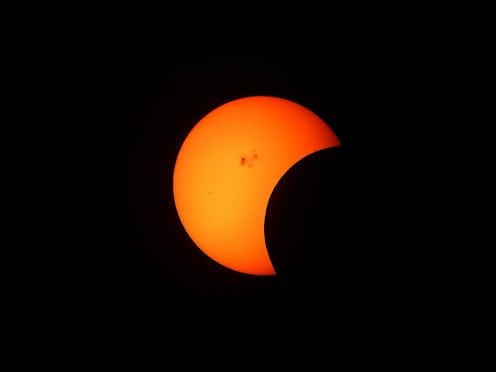Life
Here's What Will Happen To Your Poor Camera If You Try To Take Pics Of The Eclipse

The Great American Eclipse is finally upon us, and as millions of people turn out to see the moon push sort of rudely in front of the sun, they must grapple with an existential question: If you didn't snap a pic, did it even happen? We know looking directly at the eclipse can do permanent damage to our eyeballs, but is it safe to take pictures of the solar eclipse? The answer depends on the camera, and on you.
Most people's camera of choice is whatever smartphone they're carrying around in their pockets, and though there are rumors that snapping a picture of the eclipse on your phone will cause it to instantly combust (or, more likely, just sort of fizzle and die) experts say this is unlikely. According to NASA, most smartphones' lenses are too small to allow in enough light to damage your phone's image sensor. This doesn't mean you'll be able to take a clear picture, though. The digital zoom on most smartphones is not strong enough to get a clear shot, and will likely leave any picture of the sun heavily pixelated.
For better quality photos, astrophotographers (an extremely cool job title) recommend using a DSLR camera with manual controls, and a solar filter for the lens.
But with greater picture quality comes greater risk of damaging your equipment. Because the lens on a DSLR is bigger, it allows it more sunlight which can potentially destroy the camera's image sensor. You can avoid this by getting a solar filter that fits over your camera's lens which, like eclipse glasses, will block out most of the sun's harmful rays.
Taking a photo of the eclipse with a DSLR is also more complicated than just pointing and shooting. As astrophotographer Justin Starr (best name for an astrophotographer) told The Verge, in order to get the best possible picture, you will have to take into consideration the changing light, and adjust your camera's aperture, exposure time, and ISO before, during, and after the eclipse.
What is most in danger when photographing the eclipse however, is not your camera, it's your own eyes. NASA strongly urges photographers to wear special eclipse glasses when setting up their shot, because even if you're looking at a screen or through a lens, you may unconsciously glance directly at the sun.
Regardless of whether or how you choose to memorialize this historical event, make sure to take some time to enjoy it without a camera. It still counts as having seen it, I promise.